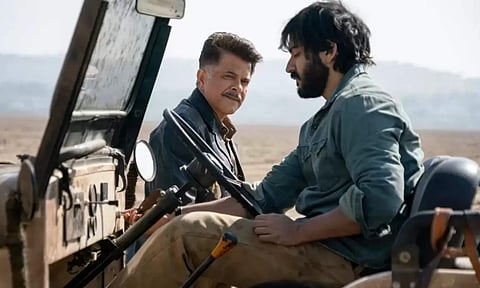Thar Movie Review: Pretty-looking western skims the surface
Rating:(2.5 / 5)
It's time we apprised ourselves of the talents of Shreya Dev Dube. The cinematographer, who shot Cat Sticks and the 2020 short film Bittu, is a rare wizard with landscapes. Her camera favours the majestic—though never, it must be said, at the cost of the miniscule. In Thar, she frames dirt roads with tiny faraway jeeps on them. She captures skid marks in the sand. Her visuals lend the film a texture and complexity it never quite earns narratively.
Cast: Anil Kapoor, Harshvarrdhan Kapoor, Fatima Sana Shaikh, Jitendra Joshi, Satish Kaushik
Streaming on Netflix
We open in 1985 in Rajasthan, on a village along the India-Pakistan border. A body is found dangling from a tree, the side of its face hacked off. This is preceded by a double murder and the looting of a drug cache. The crimes, which seem interconnected, perk up local cop Surekha Singh (Anil Kapoor) and his rotund partner (Satish Kaushik). "It's great to have some real work," Surekha says, like no would-be retiree ever. Meanwhile, a stranger, an antique dealer played by Harshvarrdhan Kapoor, comes to town. He needs help transporting ancient artefacts to the city, and comes knocking on the door of lonely homemaker Chetna (Fatima Sana Shaikh).
Thar, written and directed by Raj Singh Chaudhary, is a western. Not a proxy western, mind you, but a hardboiled one. The genre is reducible to three broad categories in the Hindi film context. There are the classic, melodramatic dacoit films of old (exemplified by but not limited to Sholay). There's something like Sonchiriya or Laal Kaptaan—darker, broodier period epics. There are also neo-westerns, and westerns by stealth, such as Navdeep Singh's indelible directorial debut Manorama Six Feet Under.
Raj tips his hat to all these traditions, and more. The screenplay, which combines mystery and gore, is essentially a sandbox for the western aficionado. There are long stretches of silence and intrigue. Characters trot about in leather boots with death in their eyes. A bus-stop eatery—complete with a portly innkeeper in suspenders—evokes a Wild West saloon. A feature of the modern western is its grappling with thorny social or historical issues. Thar, in this regard, terribly shortchanges its audience. The film mentions everything from Partition to caste, but in that vacuous, perfunctory way. Dialogue writer Anurag Kashyap can do better than "caste is hidden in one's police uniform," or, more weirdly, "smokers don't care two hoots for caste."
Some scenes, like cigarettes, crackle and burn. The women in this world are smuttier than the men (and twice as quick with expletives). Fatima, who blends pain, humour and tentativeness into a formidable whole, is a better watch than Harshvarrdhan's cold, taciturn lead. The film requires him to be many things, and though he's improved considerably as an actor, he still lacks the bandwidth for a truly complex part. Anil makes the most of a traditional role. The film's two action scenes are centred on him, not Harsh, and are all the better for it. Surekha, bruised and cornered in a shootout, recovers and fixes his aim. He's got one shot, and he makes it count. What better life lesson for any advantaged star kids standing around...


